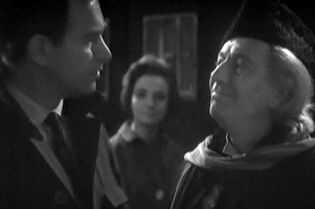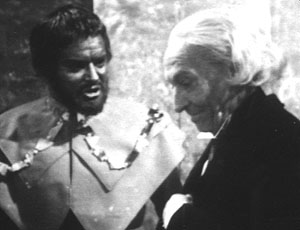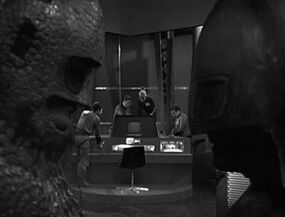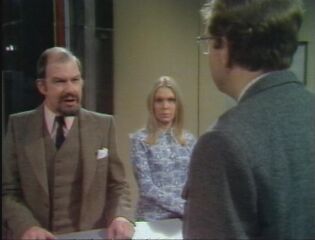User:Gusthegreat
Well, as you always say Vila, you know you are safe - with me
Welcome to the page of GUSTHEGREAT! I am an expert on all things Classic Doctor Who and on the guest actors/extras that appeared in the classic series. I have also created numerous pages for The Scales of Injustice. Additionally, I have contributed some pages to Evolution, The Romance of Crime, The English Way of Death and Dancing the Code.
There is no “Doctor Who” after 1989, except in audio books and novels.
I am a big fan of other British TV shows such as
- The Quatermass serials starring Reginald Tate, John Robinson, André Morell, Roger Delgado, Duncan Lamont, John Stratton
- Colonel March of Scotland Yard starring Boris Karloff
- The Adventures of Robin Hood starring Richard Greene, Alexander Gauge, Archie Duncan, Bernadette O’Farrell, Alan Wheatley and John Arnatt
- The Adventures of Sir Lancelot starring William Russell, Robert Scroggins and Ronald Leigh-Hunt
- HG Wells' Invisible Man starring Tim Turner, Lisa Daniely and Deborah Watling
- Ghost Squad starring Michael Quinn, Neil Hallett, Donald Wolfit, Angela Browne, Anthony Marlowe, Clare Nielsen
- The Saint starring Roger Moore
- Danger Man starring Patrick McGoohan
- Sherlock Holmes starring Douglas Wilmer, Peter Cushing and Nigel Stock
- Adam Adamant Lives! starring Gerald Harper, Juliet Harmer, Jack May and Peter Ducrow
- The Baron starring Steve Forrest, Sue Lloyd, Paul Ferris and Colin Gordon
- The Prisoner starring Patrick McGoohan and Angelo Muscat
- Man in a Suitcase starring Richard Bradford
- The Champions starring Stuart Damon, Alexandra Bastedo, William Gaunt and Anthony Nicholls
- Randall and Hopkirk (Deceased) starring Mike Pratt, Kenneth Cope and Annette Andre
- Department S starring Peter Wyngarde, Joel Fabiani, Rosemary Nicols and Dennis Alana Peters
- The Persuaders! starring Roger Moore and Tony Curtis
- UFO starring Ed Bishop, George Sewell and Wanda Ventham
- Jason King starring Peter Wyngarde
- Thriller
- Are You Being Served? starring Trevor Bannister, Mollie Sugden, Frank Thornton, John Inman, Wendy Richard, Arthur Brough and Nicholas Smith
- Fawlty Towers starring John Cleese, Prunella Scales and Andrew Sachs
- Survivors starring Ian McCulloch,Denis Lill, Lucy Fleming, Carolyn Seymour and John Abineri
- Blakes 7 starring Gareth Thomas, Paul Darrow, Michael Keating, Jacqueline Pearce, Stephen Greif, Sally Knyvette, Brian Croucher, Jan Chappell, David Jackson, Josette Simon and Steven Pacey
- The Omega Factor starring James Hazeldine, Louise Jameson, John Carlisle and Brown Derby
- Tommy and Tuppence starring Francesca Annis, James Warwick and Arthur Cox
- Agatha Christie's Miss Marple starring Joan Hickson
- Robin of Sherwood starring Jason Connery, Nickolas Grace, Clive Mantle, Philip Jackson and George Baker.
Of these, my favorites are The Saint, Danger Man, The Prisoner and Blakes 7. My favorite actors are Roger Moore, Patrick McGoohan, Paul Darrow, Douglas Wilmer, Peter Cushing, Christopher Lee, Claude Rains, Boris Karloff and Errol Flynn. My favorite film is “The Adventures of Robin Hood” (1938).
I collect old Target novelizations and action figures. The first Target novel I read was Doctor Who - Death To the Daleks. My favorite non-Doctor Who writers are Agatha Christie, Sir Arthur Conan Doyle, Georges Simenon, John Buchanan, PG Wodehouse and Roland Dahl.
Is it that Blake has a genius for leadership, or merely that you have a genius for being led?
The following extras died on unknown dates: Ian Elliott Eden Fox David J. Grahame Arnold Lee Bill McAllister Paul Phillips Clive Rogers Valerie Taylor Alan Troy Freddie White[1]
The Episodes, and why I like (or dislike) them
I am not expendable, I'm not stupid, and I'm not going
- “An Unearthly Child” - The first episode is excellent, but the final three are like a caveman soap opera.
- “The Daleks” - The first four episodes are excellent, but the final three have a typical Terry Nation B movie plot. It also wastes the acting talent of Alan Wheatley in the pitifully small role of Temmosus.
- “The Edge of Destruction” - An interesting story that examines the relationships between the four regulars. The regular cast are excellent.
- “Marco Polo” - The first “epic” “Doctor Who” story. It sounds impressive on audio, and the sets look superb in the photos. It would be better for fans in only one episode was recovered.
- “The Keys of Marinus” - Terry Nation gets to have lots of B-movie plots in this one - but the acting of the regulars and the appearances of distinguished actors such as George Colouris and Francis de Wolff help matters.
- “The Aztecs” - Barbara gets a chance to shine in this story in which the excellent plot, set design and acting make in one of the best stories of the 60s.
- “The Sensorites” - A forgotten little gem of an episode. The Sensorites might look silly and their might be a few plot holes, but it’s an enjoyable romp nonetheless.
- “The Reign of Terror” - Another forgotten episode. William Hartnell is excellent, and his scenes with the Jailer are great fun.
- “Planet of Giants” - Another forgotten episode. It looks convincing enough, and Alan Tilvern makes a good guest villain.
- “The Dalek Invasion of Earth” - Generous location filming make this one of the most memorable stories of the 1960s.
- “The Rescue” - A good vehicle for introducing a companion. William Hartnell and Maureen O’Brien automatically hav good chemistry that would continue throughout the season.
- “The Romans” - William Hartnell demonstrates his knack for comedy in this entertaining farce.
- “The Web Planet” - A very underrated story. It’s too ambitious for the budget of 60s “Doctor Who”, but it’s entertaining nonetheless.
- “The Crusade” - David Whitaker’s Shakespearian dialogue and the excellent guest cast make this one of the best historical stories.
- “The Space Museum” - The whole serial is odd, but it’s still entertaining. The eyebrows on all the guest cast are odd too.
- “The Chase” - Terry Nation gets to do several B-movie plots in this ridiculously silly story which reduces the Daleks to slow-thinking gangsters who can’t even read the numbers on a control panel. Ian and Barbara’s farewell is a tearjerker though.
- “The Times Meddler” - Another forgotten episode. Hartnell, O’Brien and Peter Purves have good chemistry, and Peter Butterworth is excellent as the Monk. A fitting conclusion to Season 2.
- “Galaxy 4” - An odd one. Stephanie Bidmead’s performance as Maaga is a highlight, but the way Steven’s part is written is appalling.
- “Mission to the Unknown” - It’s hardly a Doctor Who story, is it? Edward De Souza’s Marc Cory is a passable replacement for the Doctor, while Jeremy Young and Robert Cartland’s performances are entertaining on audio, at least.
- “The Myth Makers” - A farcical story that could of beeen a pilot for a series called “Up, Troy!” or something like that. Hartnell once again tackles the comedic bits excellently.
- “The Dalek’s Master Plan” - An epic. It probably should have been 2 episodes shorter (“The Feast of Steven” is a useless waste of time), but we can’t change that. Kevin Stoney seems to be enjoying himself enormously as Mavic Chen and the scenes with the Alien delegates in “Day of Armageddon” are always a delight to watch. It’s not perfect, but it’s entertaining.
- “The Massacre of St Bartholomew’s Eve” - One of the best historical stories. It has an excellent guest cast (André Morell, Leonard Sachs) and Peter Purves handles his scenes excellently. The scenes with the Doctor at the end of “Bell of Doom” are a delight to listen to, as well.
- “The Ark” - “The Ark” is an odd episode. Michael Imison directs it quite stylishly and Hartnell is still a delight to watch. Dodo is rather annoying though, and the Monoids are rather hard to take seriously as villains, but it’s still an enjoyable romp.
- “The Celestial Toymaker” - The first three episodes are deathly dull, but it picks up in the final episode. Peter Stephens is excellent as Cyril, but it’s odd to see such a famous actor as Michael Gough in Doctor Who.
- “The Gunfighters” - A excellent story fool of witty lines and entertaining performances is let down by the fact that the gunfight at the end is shot horribly.
- “The Savages” - One of my most wanted missing episodes. Hartnell has a great speech is episode two, Steven has some good action stuff to do (his taunting of Exorse in the caves is excellent) and Dodo is considerably less annoying than usual. The guest cast is excellent (I single out Frederick Jaeger, Ewen Solon, Peter Thomas and Geoffrey Frederick) and the smashing of the lab sounds great on audio. Ah, if only we had the visuals to go with it.
- “The War Machines” - Doctor Who’s first shaky steps into the world of the 1960s. “The War Machines” is good, the action scenes are handled well but Episode Four is padded horribly. The sight of William Hartnell in the Inferno Club is a rather disturbing sight.
- “The Smugglers” - One of the lesser historical stories, but it’s still entertaining enough. There’s quite a competent guest cast (Michael Godfrey, Terence de Marney, George A Cooper, Paul Whistun-Jones, John Ringham) and Brian Hayles’ writing is miles better than his work on “The Celestial Toymaker”.
- “The Tenth Planet” - An entertaining episode, but not a fitting final story for Hartnell. The Cybermen are quite disconcerting and creepy in their first appearance while Robert Beatty gives a good performance as General Cutler. Polly is a bit annoying though.
- “The Power of the Daleks” - A very overrated story that should have been four parts instead of six. The Doctor and Ben are horrendously annoying while Robert James’ is excellent as Lesterson and Bernard Archard is good as the villainous Bragen.
- “The Highlanders“ - “The Highlanders” is terrible. It’s boring, and Patrick Troughton and Hannah Gordon are horrendously annoying. One of the few stories that might benefit from being lost.
- “The Underwater Menace” - Ah, “The Underwater Menace”. It’s all so silly that you can’t help but love it. Joseph Fürst’s performance is perhaps, along with Graham Crowden’s Soldeed, one of the most over-the-top performances in the history of the show. It’s always nice to see good ol’ Colin Jeavons as well. By no means perfect, but it’s not that bad either.
- “The Moonbase” - For me, this is where the Patrick Troughton era starts. “The Moonbase” is a solid, if forgettable adventure. However, it’s full of some pretty rubbish scientific stuff (what was Kit Pedler thinking?), but it’s all good fun.
- “The Macra Terror” - A good, solid, sci-fi episode. It’s quite disturbing to see Ben hypnotised for such a long part of the episode, while Patrick Troughton seems to be finally getting used to the role. Peter Jeffrey is good as the Pilot, while Denis Goacher’s is quietly disturbing as the Control Voice.
- “The Faceless Ones” - Doctor Who is back in the 60s, but thankfully there’s no nightclubs. “The Faceless Ones” is another solid episode, and the best episode of Patrick Troughton’s run so far (perhaps because of the absence of Ben and Polly?). The guest cast is full of familiar faces (Colin Gordon, Wanda Ventham, Donald Pickering, Bernard Kay) and it’s nice the production team actually filmed at Gatwick Airport.
- “The Evil of the Daleks” - The Final End? Hopefully so, since the Daleks haven’t been up to standards in their recent stories. This is an episode whose reputation might improve if it stays lost, because the whole thing is... not very good. John Bailey and Marius Goring are good value as the nervous Waterfield and the bonkers Maxtible, but after episode two, it descends into a big mess of talks in sitting rooms, Jamie almost getting murdered numerous times and more boring talks in sitting rooms. It only gets moderately intreting in Episode Seven.
However, we have Episode Two, which is almost perfect. The Doctor and Jamie have good rapport and it’s always fun watching it. But for now, I think it’s best that we just have Episode Two.
- “The Tomb of the Cybermen” - You always see this story high in polls. But I always wonder why, since it’s NOT GOOD. “The Tomb of the Cybermen” would have been better if it didn’t have the Cybermen in it, because when they show up, the episode descends into the Cybermen waking up and...doing absolutely nothing. Only one Cyberman actually get up into the Control Room!
On the acting side, George Pastell is good as the manic Klieg, while Cyril Shaps puts in a characteristically good performance as the nervousness Viner. But other than that, “The Tomb of the Cybermen” is a bit of a damp squib.
- “The Abominable Snowmen” - A story which might have been helped by having incidental music. The Yeti are too cuddly to be taken seriously, Wolfe Morris is suitably sinister at Padwhatsisname and Wales makes a convincing Tibet. An entertaining story on audio at least.
- “The Ice Warriors” - One of the bettter Troughton’s with Victoria. Derek Martinus’ direction is stylish (see Victoria being chased through the glacier in Episode Four) and there’s an excellent guest cast. A good, if forgettable, story.
- “The Enemy of the World” - Doctor Who Meets James Bond: Explosions! Hovercraft! Stock explosions taken from a James Bond film! Skin-tight leather outfits!
“The Enemy of the World” is an entertaining political thriller. Patrick Troughton is excellent as Salamander, managing to produce menace even with a terrible accent. There’s lots of action, and the characters are written excellently. Every seen with Griffin is always a delight to watch.
- “The Web of Fear” - Don’t believe the DWM polls, this is really not that good. The first episode is very atmospheric, but it sadly descends into a dull mystery that is padded terribly. The shootout in Episode Four is among the best action sequences in the history of Doctor Who, but otherwise, it’s all very dull.
- “Fury from the Deep” - An Episode that could have been good, but is let down by concentrating too much on Victoria’s departure. The location filming looks good in the telesnaps and the attack on Maggie by Mr Oak and Mr Quill is among the most scariest moments to appeared in the show until now, but the scenes with the helicopter scenes in Episode Six are deathly dull on audio. A interesting, if flawed, episode.
- “The Wheel in Space” - “The Wheel in Space” is a pretty dull affair. Troughton and Hines’ chemistry just about manages to save Episode One, but it’s all downhill after that. There’s some pretty atrocious accents among the Wheel crew (what kind of accent is Michael Goldie trying to do?) and Zoe, while not quite as annoying as Victoria, isn’t much better. Even the performances aren’t very memorable, apart from James Mellor’s entertaining turn as Sean Flannigan. As Zoe says, “I feel like somebody’s been hitting me all over with small hammers”.
- “The Dominators” - It’s not as bad as is reputation. Cully is definitely companion material (watching he and Jamie blowing up the Quarks is always fun) and Zoe is less annoying than before. There’s some, er, interesting outfits, and there’s even some decent actors hanging about. There’s worse ways to spend two hours.
- “The Mind Robber” - One of the most visually memorable stories of the 60s. It’s a very odd story, but it’s well written, and there’s a good villainous turn from Emrys Jones.
- “The Invasion” - One of the most importantly stories of the late 60s. Douglas Camfield’s direction, especially in the action sequences, is superb, and Kevin Stoney is excellent as Tobias Vaughn, as is Peter Halliday as the hapless Packer. The best Cyberman story, and perhaps the best Troughton.
- “The Krotons” - Robert Holmes’ first script is not his best. There are some nice touches (the banter between the Doctor and Zoe is great) and Philip Madoc is his usual villainous self as Eelek. Not the best story, but by no means the worst.
- “The Seeds of Death” - Michael Ferguson’s choice of camera angles make this a visually interesting episode. Terry Scully is excellent as Fewsham and there’s recognisable actors like Ronald Leigh-Hunt and Christopher Coll hanging about. An entertaining episode.
- “The Space Pirates” - Not as bad as its reputation. There’s some good performances, and Holmes writes the guest cast stronger than the Doctor, Jamie and Zoe.
- “The War Games” - Another epic. Probably four episodes too long, with the first seven episodes being a forgetttable runaround. Patrick Troughton is at his best and Edward Brayshaw and James Bree play off each other excellently. The final episode is very upsetting with the knowledge that the Doctor won’t escape from the Time Lords.
- “Spearhead from Space” - Doctor Who in color! Jon Pertwee immediately makes his mark as the Doctor in this episode that is almost perfect. Hugh Burden is chilling as Channing, the tracking shot in the hospital is wonderful and the Autons attack on London is shot excellently.
- “Doctor Who and the Silurians” - Another excellent episode. The Silurians are effective villains, but the humans are almost as villainous. Fulton MacKay is good as Quinn, Peter Miles puts in a typical Peter Miles performance as Laurence while Norman Jones, Geoffrey Palmer and Thomsaine Heiner are great as well. The scenes of the plague victims in the railway station is shot excellently (a recurring theme for this season, apparently) and it’s nice to see a pre-Blakes 7 Paul Darrow. It does drag in Episode Seven, though.
- “The Ambassadors of Death” - Pertwee’s first James Bond thriller. There’s certainly a Quatermass influence (infected astronauts returning to Earth) and Carrington makes a good villain. The fight scenes are, of course, excellent and Pertwee seems already compeletly settled in.
- “Inferno” - Doctor Who at its best. The writing is excellent, the acting is excellent, the direction is excellent - the whole thing is excellent. A gem.
- “Terror of the Autons” - The definition of an average Doctor Who story. Probably Robert Holmes’ weakest script, but Roger Delgado is, of course, excellent.
- “The Mind of Evil” - A lavish James Bond thriller. The action sequences are excellent and the acting is good. There’s hardly a dull moment. First class entertainment.
- “The Claws of Axos” - Easily the weakest episode of Pertwee’s era. There’s some gigantic plot holes (why do the UNIT soldiers outside the Axon spaceship let Jo in? How do the Brigadier and Jo return to the remains of a nuclear power plant after its blown up?). The production seems to have been in a bit of a shambles (just look at the blank CSO backdrops in Filer’s car and the UNIT jeep). Pertwee and Delgado try to keep it afloat, but it’s all pretty silly.
- “Colony in Space” - An entertaining episode. The fight scenes and shoot outs are well done, and the acting is, of course, excellent.
- “The Dæmons” - An excellent episode. The main cast’s chemistry has never been so well displayed and the locations are beautiful. Perhaps the best Pertwee?








